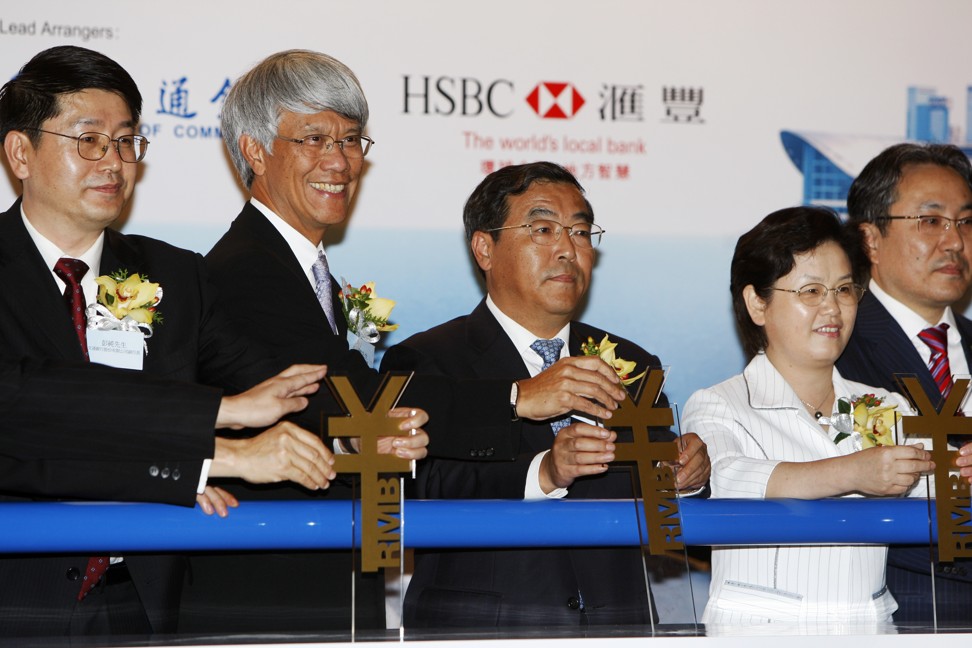
Who is the new boss of China’s US$941 billion sovereign wealth fund?
- Peng Chun, the chairman of Bank of Communications, will leave the bank to become the new chairman of China Investment Corporation
China has found a new boss for the country’s US$941 billion sovereign wealth fund, after a two-year search for the very man to head the company.
Peng Chun, the 57-year-old chairman for Bank of Communications, will leave the bank to become the new chairman of China Investment Corporation (CIC), according to people familiar with the fund’s internal announcement. Caixin Media had reported the news earlier.
Ju Weimin, currently deputy general manager for CIC, will replace Tu Guangshao as the general manager. Tu, 60, will retire from the post, according to the announcement.
Peng will be the third chairman since CIC was founded in 2007, after Lou Jiwei and Ding Xuedong, who headed the fund for six years and four years, respectively.

Lou left CIC in 2013 to become China’s finance minister, while Ding left in 2017 for the State Council, serving as the deputy secretary general.
Peng’s appointment has political significance in the current environment, as the Chinese government faces fiscal and financial challenges amid its plans to revive the economy, ease the debt burden of local governments, tackle the looming pension shortfall, and build infrastructure projects domestic and overseas.
Peng is a career bureaucrat and more of a political appointee, while Ju, a fluent English speaker, is an experienced finance professional with an international perspective, according to multiple sources.
The duo will help CIC continue to achieve its core target of preserving China’s forex reverses, they said.
Peng spent a third of his career in Xinjiang province first as an official at the People’s Bank of China’s branch, then at the provincial cadre school and later at the provincial government.
He joined BoCom in 1994 as the deputy branch manager in Ürümqi in Xinjiang, and worked his way up to become the bank’s deputy president in 2004.
Peng briefly left BoCom to work for CIC from 2010 to 2013, serving as the deputy general manager of CIC and the general manager of Central Huijin Investment, the domestic arm of CIC that mainly invests in large state-owned financial institutions.
After three years at CIC, Peng returned to BoCom as its president.
Last February, Peng was appointed as chairman and Party Committee secretary at BoCom, replacing Niu Ximing, who stepped down from the post earlier than expected due to “health reasons”, according to the bank’s statement.
“Peng has good political quality and rich hands-on experience,” the Organisation Department of the Central Committee said in an appraisal of Peng at that time, according to a Xinhua report.
“He knows the company business and is a good manager. He puts a high value on following the rules in the banking industry. Being considerate, he has clear thinking, calm character and practical style. He keeps a low personal profile and actively maintains the stability of the management team.”
The Organisation Department of the Central Committee is a key Communist Party organ controlling nearly 90 million party personnel assignments throughout the national system.
Peng’s appointment ended a two-year search by CIC for a new leader.
Set up by China during the global financial crisis to diversify its foreign exchange reserves, the fund has repeatedly come under criticism in the past for its overseas losses, botched investment decisions, and involvement with the US private equity group Blackstone.
CIC bought a 9.9 per cent stake in Blackstone ahead of its IPO in 2007, but later saw the value of the investment sink, which prompted criticism in China. Last year, CIC exited Blackstone amid growing trade tensions between Beijing and Washington.
After Ding left in 2017, CIC has had a difficult time finding a new leader, a coveted position in the financial industry, as the high bar limited the choice of candidates, sources said.
The head of the fund comes under intense scrutiny as they have to deliver on returns while taking the blame for poor investment decisions.
The fund, subject to financial supervision by the Ministry of Finance, also faces competition from the State Administration of Foreign Exchange, which manages foreign exchange reserves. SAFE comes under the central bank, which also provides funding to CIC.
The fund has lost some of its significance because of its rivalry with SAFE.


